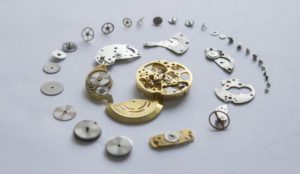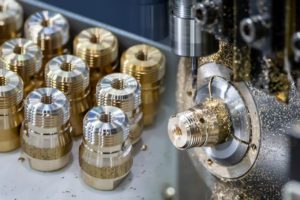When you are seeking custom-machined parts for your business, the materials they are crafted from matter as much as the methods used. By carefully selecting the right metal for your product’s intended purpose, you can ensure that your parts will perform as expected and stand up to the rigors of use.
Different metals and alloys feature unique properties that suit them best for certain tasks. For example, some metals are harder than others, making them more resistant to wear and tear. Others are more ductile, meaning they can be easily shaped into the desired form. Still, others have a low melting point, making them ideal for welding or soldering.
Today, we are going to review some of the most common metals and alloys used in machining. If you are wondering whether a particular material will best suit your parts needs, contact us anytime to ask one of our expert machinists.
Steel
Steel is an alloy of iron and carbon, and it is one of the most important materials in modern industrial applications. Strong and durable, it proves ideal for a wide variety of uses, from construction materials to home appliance parts, tools, automotive components, and more.
There are a few different types of steel, each with its own set of properties. For example, stainless steel is resistant to corrosion, while tool steel is particularly hard and durable.
In general, the material remains highly malleable during the parts manufacturing process and can be formed into nearly any shape needed to satisfy your requirements. Due to its broad applicability across many different industries, it is also a widely available, cost-effective, and high-performing option for many applications.
Brass
Brass is an alloy combining copper and zinc, and it shares many of the same properties as both of those metals. Like steel, its strength and durability prove an excellent choice for applications where frequent wear and tear are present factors.
Brass also has a low friction coefficient, which makes it useful for moving parts that need to slide smoothly against each other. Additionally, brass is non-magnetic and resistant to corrosion.
This combination of properties makes brass a popular option for plumbing and electrical parts. Parts like valves, fittings, and switchgear are all commonly made from brass. Its high malleability also allows it to be formed into custom, proprietary, or nonstandard shapes; such as doorknobs or musical instruments like trumpets and saxophones.
Aluminum
Aluminum is a silver-white metal that is light in weight yet delivers high-strength performance. It is also naturally corrosion resistant and an excellent conductor of electricity.
These properties establish aluminum as a versatile solution for many applications. From airplanes to kitchen appliances, it can serve as an ideal parts material for a long list of potential uses.
Machine parts that benefit from the use of aluminum include gears, pulleys, and sprockets. Aluminum is also used in the construction of many types of vehicles, from bicycles to cars. In fact, almost all commercial aircraft are made partly or entirely of aluminum due to its lightweight properties.
Titanium
Titanium is a durable, low-density metal prized for its strength and resistance to corrosion. It is often used in the manufacturing of aircraft, spacecraft, and other high-performance machine parts.
Titanium is also non-magnetic and has a low thermal conductivity, making it ideal for many applications where these properties are desired. Another notable advantage is that it can be joined to other metals using Welding, brazing, and soldering.
Machine parts that benefit from the use of titanium include engine components, fasteners, and bearings. Titanium is also used in the production of medical implants and prosthetics due to its biocompatibility and resistance to wear.
For example, titanium gears are often used in high-speed applications such as turbines and jet engines. Titanium valves are also widely used in the automotive industry due to their ability to withstand high temperatures and pressures.
Iron Alloys
An iron alloy is an alloy that contains iron as the primary element. These materials are commonly used in numerous metal machine parts due to their robust strength and resistance to rust.
Many different types of metals can be combined with iron to create alloys, including carbon, chromium, manganese, silicon, and vanadium. The amount of these other metals present will affect the properties of the resulting alloy. For example, adding carbon to iron creates steel, which is much harder than pure iron but is also more susceptible to rusting.
Chromium, on the other hand, increases the strength and corrosion resistance of iron. As a result, chromium-based alloys are often used in applications where materials will be exposed to high levels of stress or moisture.
Work with a Metal Machining Partner for Your Parts Needs Today
At Advance CNC, our team of expert machinists provides 100% U.S.-based parts manufacturing services for businesses across the globe at scalable volumes. From our two Ohio facilities, we will work with you to create a completely custom solution for your product requirements to ensure that your pats align with your product’s intended purposes.
To learn more about how we can assist you with your metal machining needs, contact us today.






